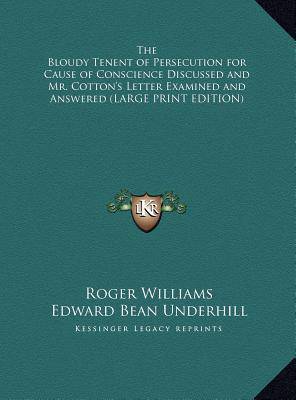
En raison d'une grêve chez bpost, votre commande pourrait être retardée. Vous avez besoin d’un livre rapidement ? Nos magasins vous accueillent à bras ouverts !
- Retrait gratuit dans votre magasin Club
- 7.000.000 titres dans notre catalogue
- Payer en toute sécurité
- Toujours un magasin près de chez vous
En raison de la grêve chez bpost, votre commande pourrait être retardée. Vous avez besoin d’un livre rapidement ? Nos magasins vous accueillent à bras ouverts !
- Retrait gratuit dans votre magasin Club
- 7.000.0000 titres dans notre catalogue
- Payer en toute sécurité
- Toujours un magasin près de chez vous
The Bloudy Tenent of Persecution for Cause of Conscience Discussed and Mr. Cotton's Letter Examined and Answered
Roger Williams
Livre relié | Anglais
75,95 €
+ 151 points
Format
Description
""The Bloudy Tenent of Persecution for Cause of Conscience Discussed and Mr. Cotton's Letter Examined and Answered"" is a book written by Roger Williams. This large print edition of the book discusses the issue of persecution for religious beliefs and the role of the government in regulating religion. Williams argues against the idea of using force to compel people to adopt certain religious beliefs and practices. He examines a letter written by John Cotton, a prominent Puritan minister, and responds to it, offering his own perspective on the issue. The book provides a historical perspective on the debate over religious freedom and tolerance, and its relevance to contemporary issues. This edition is printed in large print, making it accessible to readers with visual impairments or reading difficulties.(LARGE PRINT EDITION) 1848. Rogers was one of the Seekers, a group that adhered to no specific religious practices. It is as a Seeker that he wrote The Bloudy Tenent, while in England attempting to win back the charter for Rhode Island, his enclave of religious toleration amidst the intolerance of the Puritans. Williams' belief, and the main theme of The Bloudy Tenent, was that all individuals and religious bodies were entitled to religious liberty as a natural right, and that civil governments did not have the authority to enforce religious laws. The Bloudy Tenent is structured as a type of dialog between Truth (as seen by Puritans like John Cotton) and Peace (Williams' view) over the issue of Persecution, for Cause of Conscience (namely, the issue of laws favoring one religion over another, and their validity from a scriptural point of view.) It was Williams' thesis that these laws, or any use of secular authority to promote any religious sect, was contrary to the teachings in the Bible. To do so, in Williams' view, was to fall prey to the same error as the tenants in the biblical parable, who killed the son of the landowner in order to lay claim to his property. The Bloudy Tenent is considered to be significant among the works of this period. See other titles by this author available from Kessinger Publishing.This scarce antiquarian book is a facsimile reprint of the old original and may contain some imperfections such as library marks and notations. Because we believe this work is culturally important, we have made it available as part of our commitment for protecting, preserving, and promoting the world's literature in affordable, high quality, modern editions, that are true to their original work.
Spécifications
Parties prenantes
- Auteur(s) :
- Editeur:
Contenu
- Nombre de pages :
- 496
- Langue:
- Anglais
Caractéristiques
- EAN:
- 9781169852693
- Date de parution :
- 01-02-11
- Format:
- Livre relié
- Format numérique:
- Genaaid
- Dimensions :
- 216 mm x 279 mm
- Poids :
- 1424 g

Les avis
Nous publions uniquement les avis qui respectent les conditions requises. Consultez nos conditions pour les avis.






